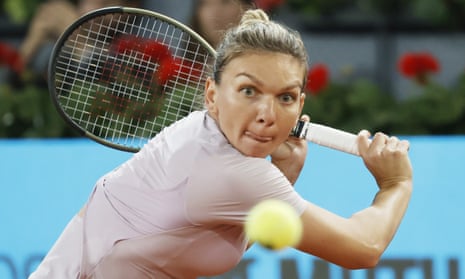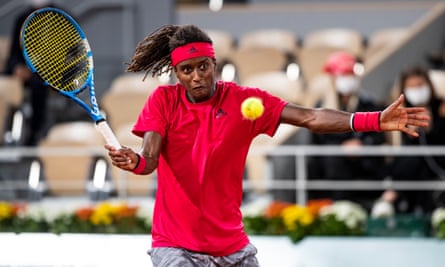
Simona Halep happy to return but stark contrast in judgments baffles
As she warms up in Miami, we don’t know why the court of arbitration for sport ruled so differently to the original tribunal
For a player of her stature, a former world No 1 for 64 weeks and a two-time grand slam champion, Simona Halep has often preferred to conduct her work in peace and remain outside of the spotlight. But all eyes will be on her this week as she makes her return to professional tennis for the first time in 19 months at the Miami Open after the court of arbitration for sport (Cas) reduced her four-year ban for intentional doping to nine backdated months, ruling that she was not guilty of intentional doping and allowing her to return to the court immediately.
The Romanian will begin with a notable first round match in Miami against Paula Badosa, a former world No 2, but a win would lead to a certified headline battle. Aryna Sabalenka, the Australian Open champion and current world No 2, awaits the winner.
Even as Halep steps on to the court to resume her career, there remain unanswered questions about how the initial tribunal, conducted via the organisation Sport Resolutions, and Cas came to such different, unanimous conclusions, with the full reasoned decision from the latter yet to be released.
Halep tested positive for roxadustat after her loss in the first round of the 2022 US Open and her case faced numerous delays due to the emergence of irregularities in her athlete biological passport (ABP), a system that registers the data from previous blood tests and determines irregularities in blood properties that may suggest blood doping.
During the first-instance hearing last year, both Halep’s experts and the International Tennis Integrity Agency’s experts separately tested the keto MCT collagen supplement that the player’s team said she had taken and their findings clashed over whether the supplement was contaminated with roxadustat. Ultimately, the independent tribunal concluded that, even if the supplement had been contaminated, it did not explain the estimated concentration of roxadustat in her sample. She was eventually imposed with two separate four-year bans through both roxadustat and ABP irregularities.
The Cas panel, however, came to the conclusion that the presence of roxadustat in her sample was not intentional and they dismissed the ABP charge. They offered a hint of their different methodology on the latter distinction, with Cas accepting the results of a private blood sample Halep had given on 9 September 2022 after undergoing an unrelated nasal surgery.
Despite the attention Halep has received, her case is merely one of the more high profile and striking instances of numerous cases where the first tribunal and Cas have been at odds, the two expert tribunals presumably looking at largely the same evidence and similar arguments yet often forcefully came to such starkly different conclusions. It also does not seem to be merely the initial tribunal enforcing harsher penalties on athletes, which are inevitably rolled back upon appeal by Cas. Cas has upheld appeals in cases involving Halep, Mikael Ymer, Marin Cilic, Maria Sharapova and Sara Errani in recent years.

In 2022, Ymer, a top 100 player, faced an independent tribunal after being charged with committing a “whereabouts” failure after three missed tests in a 12 month period. Ymer contested the final one of these and the initial tribunal concluded that he had not committed any significant fault with no ban. After the International Tennis Federation appealed, Cas banned Ymer for 18 months. Shortly after the decision last July, he announced that he would be retiring from the sport aged 24.
after newsletter promotion
With the first tribunal and Cas unable to find any common ground in certain rulings, the credibility of the anti-doping system in professional tennis has been weakened.
As Halep, now 32, returns to competition and tries to rebuild her level in the final stretch of her career, her presence is unlikely to generate the drama that followed Maria Sharapova after her return to professional tennis in 2017 when her doping ban had also been reduced upon appeal by Cas. Halep is a well-liked player in the locker room and she has garnered a lot of sympathy and support from many players in the 19 months since she last competed.
Iga Swiatek, meanwhile, will look to complete a second “Sunshine Double” two years after she first pulled off the achievement and rose to No 1, while Carlos Alcaraz’s prospects of pulling off the achievement for the first time have been significantly boosted by the withdrawal of Novak Djokovic. Emma Raducanu will hope to make further progress as she faces Wang Xiyu in the opening round, with the 22nd seed, Anna Kalinskaya, looming for the winner in round two.
Source: theguardian.com



